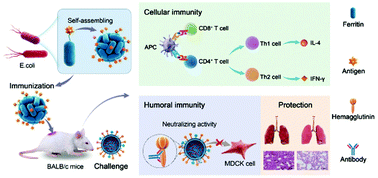A self-assembling nanoparticle vaccine targeting the conserved epitope of influenza virus hemagglutinin stem elicits a cross-protective immune response†
Abstract
Various vaccine strategies have been developed to provide broad protection against diverse influenza viruses. The hemagglutinin (HA) stem is the major potential target of these vaccines. Enhancing immunogenicity and eliciting cross-protective immune responses are critical for HA stem-based vaccine designs. In this study, the A helix (Ah) and CD helix (CDh) from the HA stem were fused with ferritin, individually, or in tandem, yielding Ah-f, CDh-f and (A + CD)h-f nanoparticles (NPs), respectively. These NPs were produced through a prokaryotic expression system. After three immunizations with AS03-adjuvanted NPs in BALB/c mice via the subcutaneous route, CDh-f and (A + CD)h-f induced robust humoral and cellular immune responses. Furthermore, CDh-f and (A + CD)h-f conferred complete protection against a lethal challenge of H3N2 virus, while no remarkable immune responses and protective effects were detected in the Ah-f group. These results indicate that the CDh-based nanovaccine represents a promising vaccine platform against influenza, and the epitope-conjugated ferritin NPs may be a potential vaccine platform against other infectious viruses, such as SARS-COV-2.



 Please wait while we load your content...
Please wait while we load your content...